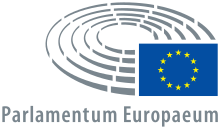Cleveland and Yorkshire North (European Parliament constituency)
| Cleveland and Yorkshire North | |
|---|---|
| European Parliament constituency | |
 European Parliament logo | |
| Member state | United Kingdom |
| Created | 1984 |
| Dissolved | 1994 |
| MEPs | 1 |
| Sources | |
| [1] | |
Prior to its uniform adoption of proportional representation in 1999, the United Kingdom used first-past-the-post for the European elections in England, Scotland and Wales. The European Parliament constituencies used under that system were smaller than the later regional constituencies and only had one Member of the European Parliament each.
The constituency of Cleveland and Yorkshire North was one of them.
It consisted of the Westminster Parliament constituencies of Hartlepool, Langbaurgh, Middlesbrough, Redcar, Richmond (Yorks), Skipton and Ripon, Stockton North, and Stockton South.[1]
Members of the European Parliament[edit]
| Election | Member | Party | |
|---|---|---|---|
| 1984 | Peter Vanneck | Conservative | |
| 1989 | David Bowe | Labour | |
Election results[edit]
| Party | Candidate | Votes | % | ±% | |
|---|---|---|---|---|---|
| Conservative | Peter Vanneck | 73,217 | 40.7 | ||
| Labour Co-op | Paul F. Tinnion | 70,592 | 39.3 | ||
| SDP | R.C. (Colin) Beever | 35,916 | 20.0 | ||
| Majority | 2,625 | 1.4 | |||
| Turnout | 179,725 | 31.7 | |||
| Conservative win (new seat) | |||||
| Party | Candidate | Votes | % | ±% | |
|---|---|---|---|---|---|
| Labour | David Bowe | 94,953 | 47.6 | +8.3 | |
| Conservative | Peter Vanneck | 70,861 | 35.5 | -5.2 | |
| Green | Owen Dumpleton | 17,225 | 8.6 | New | |
| SLD | Thomas W. Mawston | 8,470 | 4.2 | -15.8 | |
| SDP | Ralph I. Andrew | 7,970 | 4.0 | New | |
| Majority | 24,092 | 12.1 | N/A | ||
| Turnout | 199,479 | 34.9 | +3.2 | ||
| Labour gain from Conservative | Swing | ||||
References[edit]
- ^ "David Boothroyd's United Kingdom Election Results". Archived from the original on 9 February 2008. Retrieved 20 January 2008.
- ^ "European elections 14-17 June 1984" (PDF). European Parliament Directorate-General for Information and Public Relations. July 1984 – via Archive of European Integration, University of Pittsburgh.
- ^ "Elections 1989 - Results and Elected Members" (PDF). European Parliament Directorate-General for Information and Public Relations. 13 July 1989 – via Archive of European Integration, University of Pittsburgh.
External links[edit]
- David Boothroyd's United Kingdom Election Results Archived 2008-02-09 at the Wayback Machine
